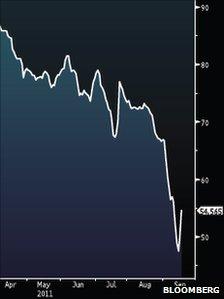Europe's four big dilemmas
- Published

Decision time for the euro is fast approaching
In October, Europe's leaders reached yet another wide-ranging deal to prevent economic problems from causing financial meltdown in the eurozone.
For many onlookers, the issues they face may seem complicated and interconnected.
But essentially they boil down to four big dilemmas.
How these dilemmas are resolved will decide whether the eurozone stays together, or ultimately unravels despite the latest agreement.
Borrowers vs Lenders

What the market thinks of Greek government debt
Like the US and UK, Europe faces an enormous overhang of accumulated government and private-sector debt, external, much of which is now not repayable.
So the question is, how much gets written off, and who picks up the tab?
For the eurozone as a whole, the debt problem is comparable with that of the US, and potentially manageable.
The problem is that some eurozone countries are much more heavily indebted than others.
In October's deal some private sectors lenders have already agreed to write down the value of Greek debt by half.
Investors also think the Portuguese, Irish, and even the Spanish and Italian governments, may eventually follow suit.
But when bad debts get written off, someone has to take a loss.
While some of those debts are held in the US, UK or elsewhere overseas, most of it is held by the European banks, and increasingly by the European Central Bank (ECB).

Germany may end up footing much of the bill
This is the primary reason for the recent loss of confidence in the European banking system.
But while Germany can afford to rescue its banks, as the Irish Republic has already demonstrated, other countries may not be able to rescue theirs.
The October package calls for banks to invest more than 100bn euros building up their capital, but it is not yet clear if they will be able to do so without intervention from governments.
If other European countries join Greece in writing off their debts, banks may need even more money.
Ultimately Germany and other less-indebted countries may have to bear much of the cost of rescuing the eurozone's banks as well as its weaker governments.
Austerity vs growth
Like everywhere else, most European governments have seen their borrowing balloon during the recession and anaemic recovery.
At the same time, fears over southern European governments' ability to repay their debts mean their borrowing costs have also gone through the roof.
Under pressure from Germany and the ECB, all of these countries have been pushing through painful spending cuts and tax rises.
To set a good example, Germany has even donned the hair shirt itself, promising to eliminate its own modest deficit by 2013.
But here's the problem: austerity is killing growth throughout Europe.
And with less profits to tax and more dole cheques to write, weak growth makes it even harder for governments to cut their borrowing and repay their debts.
In order to turn the slowing eurozone economy around, the ECB now looks set to slash interest rates from their current 1.5%.
The central bank considered buying up more Italian and Spanish debt, pumping cash into the financial system and easing the pressure on those countries to slash their borrowing.
But this move has always been strongly opposed by German members of the ECB.
Another option to stimulate growth is for the few other countries that markets are still willing to lend to to borrow and spend more, offsetting spending cuts in southern Europe.
Yet for Germany, who can currently borrow at unprecedentedly cheap interest rates, borrowing is anathema.
Discipline vs Solidarity
Germany's view on the eurozone crisis is simple.
Southern European governments borrowed recklessly at the cheap interest rates available inside the euro.
Now they are being punished by markets, and must learn discipline.
Germany wants other governments to incorporate strict budget rules into their constitutions to stop such recklessness in future.

A 20% unemployment rate helped spark Egyptian-style mass protests in Spain
But rules, with penalties attached, may not be credible. Imposing a fine on an over-indebted government is rather like kicking someone when they are down.
Indeed, just such a "stability pact" of budget rules, insisted on by Germany at the euro's creation, was quickly broken with impunity by Germany itself.
Moreover, the focus on discipline misses a bigger point.
While Germany's view may be apt for Greece - whose government cheated on its borrowing statistics to qualify for the euro in the first place - it is grossly unfair for Spain.
Before the financial crisis, Spain's government had lower debt levels than Germany's, and (unlike Germany) actually spent less than it earned in taxes.
But the country experienced a property bubble that then burst spectacularly, leaving its economy high and dry.
Wages, inflated during the good years, are now uncompetitive, and unemployment has shot up to 20%.

Detroit, in Michigan, has suffered an economic disaster, mitigated by US government money
Yet, inside the euro, Spain cannot devalue to regain a price advantage. Nor can it necessarily expect the ECB to cut interest rates or buy up its debts.
Being put a fiscal straitjacket as well just makes things worse.
Compare this with the US state of Michigan, where the collapse of the US car industry has spelled disaster.
Unlike in Europe, the US has a federal government that can tax other states in order to help out Michigan, by paying for unemployment benefits and rehabilitating the big car companies.
If the euro is to function in the future, economists warn, then a similar system of centralised fiscal transfers will be needed there too.
And in the current crisis, again it is Germany that would foot much of the bill.
Europe vs the Nations
On the face of it, the big political standoff in Europe is one of paymaster Germany versus bankrupt southern Europe.
For German voters, their country's post-War economic miracle was built on a hard currency, prudent finances, and strong exports.
It is hard for German voters to fathom that these very virtues are at the heart of the current crisis.
But Germany has everything to lose if it does not help the south out, and the eurozone unravels.
If the Greeks, Italians and others default on their debts, German and French lenders would be the biggest losers.

As Greece's economy shrinks and shrinks, its people cry out. But can German voters hear them?
If they also leave the euro, it would be a legal and financial disaster for all concerned.
Moreover, German export success for the past decade has been built on the weaker, more competitive exchange rate that came with sharing a currency with southern Europe.
Without the euro, safe haven Germany could expect its currency to shoot up, with devastating consequences for the country's export-driven industry.
Southern Europeans meanwhile would see their currencies plummet outside the euro, leading to rises in inflation and their cost of living as painful as the austerity they are protesting against.
Yet these stark realities are not widely appreciated in Germany or its neighbours.
Because the real problem is that there is nobody who can credibly speak for the common interest of Europe.
Since its inception in the 1950s, the European project has been run and controlled by a club of national governments.
The political process has been one of haggling behind closed doors, with issues presented to electorates as a matter of competing national interests.
But such haggling is dangerous in a financial crisis.
Jose Manuel Barroso: "The measures have taken too long and they have not been fully delivered"
Any solution must be agreed by 17 governments, and ratified by 17 parliaments, an impossibly slow process.
And the longer it takes, the more bitter each dispute risks becoming, and the greater the market's loss of confidence in the euro becomes, undermining Europe's fragile economy.
The European Commission president, Jose Manuel Barroso, has tried to speak for the common interest, pleading for the Commission to take the lead in solving Europe's problems.
But he is a political appointee, and as such, he is easily ignored by national leaders and scarcely noticed by the wider public.
Perhaps, if Mr Barroso were an elected leader, he could guide European public opinion towards a comprehensive solution to the crisis that balanced the interests of the different nations.
But as it is, the European public is very far from understanding the issues, or agreeing to the greater economic and political integration that may be needed to save the euro.
Sadly, this political dilemma is one that may not have a workable solution.
- Published15 September 2011
- Published14 September 2011
- Published27 November 2012
- Published15 September 2011